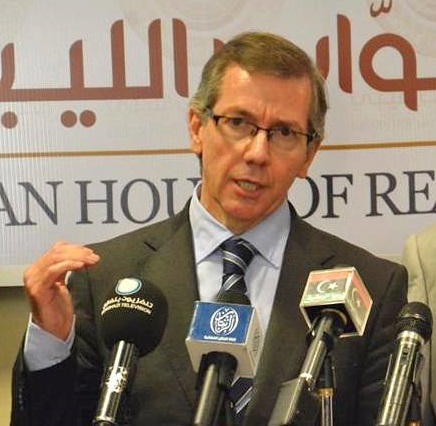After months of diplomatic efforts, the UN Special Representative and Head of the United Nations Support Mission in Libya, Bernardino León, announced on October 8, 2015 that an agreement had been reached in Skhirat on the names for a Government of National Accord in Libya.
Two rival parliaments and governments have existed in Libya since 2014: one in Tobruk, east of Benghazi, and another in Tripoli. The House of Representatives (HoR) in Tobruk is the internationally recognized parliament while the General National Congress (GNC) in Tripoli is supported by Islamists and Misratan militias, but also by Turkey and Qatar.
The proposed Presidential Council would be made of six members, with their votes expected to have the same value in the first rounds of voting. It has been proposed that all of them rotate in the international representation role of Libya in order not to create political unfairness.
The prime minister proposed was Mr. Fayex Sarraj, a Tripoli-born engineer and member of the House of Representatives in Tobruk. Mr Amed Meitig from the west (a Misratan businessman), Fathi Meibari from the east (Minister of Education in the Tobruk government), and Musa Kuni from the south (member of the Tuareg community) were the three deputy prime ministers. Finally, Mr Omar Aswad from Zintan and Mohammed Ammari from Tripoli’s General national Council were named as senior ministers to complete the presidential council.
A list of candidate members of government has also been proposed, but Bernardino León remarked on Saturday that they are just “suggestions made by participants in the Libyan Political Dialogue”: “only the Presidential Council shall decide on whether or not to accept these suggestions”.
Now it is up to the House of Representatives in Tobruk and the Global National Council in Tripoli to vote on it, but it will not be an easy task since members of both of them have already expressed sharp criticism of the proposal.
References and Suggested Readings
United Nations Support Mission in Libya (UNSMIL), “Names of Government of National Accord Proposed. Excerpts from SRSG Bernardino Leon’s Press Conference in Skhirat, Morocco, on Thursday 08 October 2015“, October 8, 2015.
The Guardian, “Libya national unity government announced by UN after months of talks”, October 9, 2015.
United Nations Support Mission in Libya (UNSMIL), “Leon: Presidential Council Chooses Members of Government; Other Candidate Names Remains a Suggestion”, October 10, 2015.
Libya’s Channel, “Libya rivals urged to sign peace deal, accept UN proposed unity government”, October 11, 2015.
Patrick Markey and Ahmed Elumami, “Bumpy road ahead for U.N.-proposed Libya peace deal”, October 12, 2015.
Mohamed Mustafa, “Bernardino Leon, Abubakr Buera @press conference @Libyan House of Representatives – Tobruk“, July 1, 2015.
On Libya after Qaddafi.
Frederic Wehrey, “ENDING LIBYA’S CIVIL WAR. Reconciling Politics, Rebuilding Security“, Carnegie Endowment for International Peace, 2014.
Christopher S. Chivvis, Jeffrey Martini, “Libya After Qaddafi. Lessons and Implications for the Future”, RAND Corporation, 2014.
Christopher M. Blanchard, “Libya: Transition and U.S. Policy”, Congressional Research Service, August 3, 2015.

